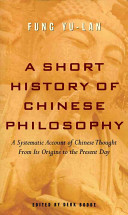 My current book-in-progress-in-which-I’m-actually-making-progress is an introductory book on Chinese philosophy by Fung Yu-Lan. I’ve never really tackled Chinese philosophy before – it’s a major lacuna in my philosophical education, which is more extensive in Western, Native American and Indian (i.e. South Asian) philosophical traditions.
My current book-in-progress-in-which-I’m-actually-making-progress is an introductory book on Chinese philosophy by Fung Yu-Lan. I’ve never really tackled Chinese philosophy before – it’s a major lacuna in my philosophical education, which is more extensive in Western, Native American and Indian (i.e. South Asian) philosophical traditions.
Obviously, an introduction to Chinese philosophy starts, more or less, with Confucius. The core principal is apparently called “jen” (via Wade-Giles, used by Fung). The book doesn’t provide characters, which I’m actually interested in knowing, so I did a little bit of research, to tie things together. I also tried to find out the Korean readings of the characters in question, as that interests me too.
I will try to summarize pages 42-44 in Fung’s book in my own words:
The key principal of all of Confucius’ thought is human-heartedness, or jen (仁, pinyin [ren], Korean 인 glossed as 어질다 [benevolent, virtuous] in a hanja dictionary). Jen is in turn divided into a “positive” and “negative” aspect, each of which is a sort of corollary of Westerndom’s “Golden Rule”: conscientiousness toward others or loyalty, chung (忠, pinyin [zhong], Korean 충 glossed as 충성 [loyalty]), which really means “Do unto others as you would have them do unto you,” and altruism or reciprocity, shu (恕, pinyin [shu]?, Korean 서 glossed as 용서 [pardon, mercy]), which really means “Don’t do unto others what you would not have them do unto you.” Then one of Confucius’ students, Tseng Tzu, summarizes: “Our master’s teaching consists of the principle of chung and shu, and that is all” (Analects, VII).
